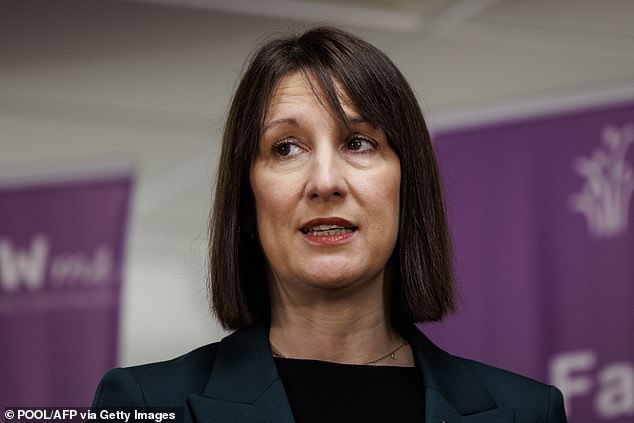Table of Contents
Businesses are cutting jobs at the fastest rate in almost four years as Labour’s “doom and gloom rhetoric and policies” take their toll.
The closely watched Purchasing Managers’ Index (PMI) report showed the sharpest drop in private sector workforce figures since January 2021, when Britain was still in the grip of Covid lockdowns.
And it showed business optimism fell to the lowest level in two years amid concerns over tax rises announced by Rachel Reeves in the Budget.
Chris Williamson, chief business economist at S&P Global Market Intelligence, which compiled the PMI survey, said: “The loss of confidence and increased job cuts hint that the worst is yet to come as we head into the new year.” .
It is the latest sign that the Chancellor’s £25bn budget raid on employers’ National Insurance (NI) is holding back growth.
The report says some employers decided not to replace outgoing staff as a result of rising labor costs.
Job cuts: Chancellor Rachel Reeves’ £25bn budget raid on employers’ national insurance appears to curb growth
Others said changes at NI have led them to reduce hours and embark on “longer-term efforts to restructure the workforce”.
He also noted that the imposition of a series of new regulations on workers’ rights contributes to the “marked decline in hiring.”
The figures come after a warning last week that the economy was under “recession watch” after official data showed gross domestic product (GDP) declined in October.
This was attributed to companies hesitating about their plans while waiting for the budget, which arrived at the end of October.
However, there are signs that activity may have deteriorated further after the measures introduced by Reeves proved even worse than feared.
And the Chancellor’s decision to splash out tens of billions more on borrowing and spending has created a new headache by increasing inflationary pressures.
Tomorrow’s figures are expected to show inflation has risen to 2.6 percent, which would be the highest since March.
Williamson said: “Businesses are reporting a triple whammy of gloomy news as 2024 draws to a close, with economic growth stalling, employment falling and inflation rising again.
“Economic growth momentum has been lost since the strong expansion seen at the start of the year, as businesses and households have responded negatively to the pessimistic rhetoric and policies of the new Labor government.
‘Business confidence has fallen to its lowest level in two years as companies weigh a tougher outlook for sales alongside rising costs, particularly for staff, as a result of changes announced to the budget .
“Businesses are responding to rising National Insurance contributions and new staffing regulations with a sharp decline in hiring, causing employment to fall in December at the fastest rate since the 2009 global financial crisis. , if the pandemic is excluded.”
The PMI survey’s headline reading of 50.5 – on a scale where the 50 mark separates growth from contraction – was unchanged from November, but was worse than economists expected.
It showed that business activity is growing only marginally – and at a much weaker pace than in the first half of the year before Labor came to power.
Consulting firm Capital Economics said the data was consistent with a 0.3 percent GDP contraction in the fourth quarter.
But they noted that the PMI covers only the private sector and would not capture increased government spending.
Separate figures from S&P Global yesterday showed UK consumer confidence sank to a three-month low as the high cost of living eats away at disposable income.
DIY INVESTMENT PLATFORMS

AJ Bell

AJ Bell
Easy investing and ready-to-use portfolios

Hargreaves Lansdown

Hargreaves Lansdown
Free Fund Trading and Investment Ideas

interactive inverter

interactive inverter
Fixed fee investing from £4.99 per month

sax

sax
Get £200 back in trading fees

Trade 212

Trade 212
Free trading and no account commission
Affiliate links: If you purchase a This is Money product you may earn a commission. These offers are chosen by our editorial team as we think they are worth highlighting. This does not affect our editorial independence.

